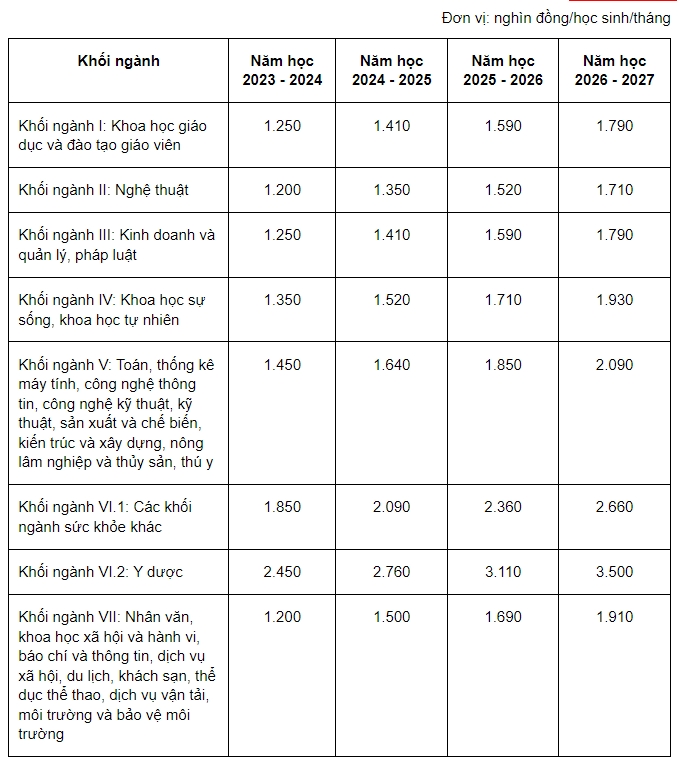What are principles for determining tuition fees for public higher education institutions in Vietnam?
What are principles for determining tuitions for public higher education institutions in Vietnam?
According to the provisions of Clause 3, Article 8 of Decree 81/2021/ND-CP, the principles for determining tuitions for public higher education institutions are as follows:
- Public higher education institutions partially covering their own recurrent expenditures and those assured by the state for regular expenditures (hereinafter referred to as public higher education institutions not yet self-assured for regular expenditures) determine tuitions not exceeding the fee ceiling at point a, clause 1 and point a, clause 2, Article 11 of Decree 81/2021/ND-CP;
- Public higher education institutions self-assuring recurrent and investment expenditures, public higher education institutions self-assuring only recurrent expenditures determine tuitions for each sector based on the adjustment coefficient compared to the tuition ceiling stipulated for public higher education institutions not yet self-assured for recurrent expenditures according to Clause 2, Article 11 of Decree 81/2021/ND-CP;
- For training programs of public higher education institutions that meet the quality accreditation standards prescribed by the Ministry of Education and Training or meet foreign or equivalent quality accreditation standards, the higher education institutions are allowed to determine the tuitions for the program based on the economic-technical norms issued by the institution, openly explaining to learners and society.

Principles for determining tuitions for public higher education institutions in Vietnam (Image from the Internet)
What are the regulations on tuitions from the academic year 2023 - 2024 to the academic year 2026 - 2027 for public higher education institutions in Vietnam?
Based on Clause 2, Article 11 of Decree 81/2021/ND-CP as amended by point b, clause 3, Article 1 of Decree 97/2023/ND-CP regulating tuitions from the academic year 2023 - 2024 to the academic year 2026 - 2027 for public higher education institutions as follows:
- The tuition ceiling for public higher education institutions not yet self-assured for regular expenditures is shown in the following table (hereinafter referred to as Table 1).

- Public higher education institutions self-assuring recurrent expenditures: The tuitions are determined at a maximum of twice the tuition ceiling in Table 1 corresponding to each sector and academic year;
- Public higher education institutions self-assuring recurrent and investment expenditures: The tuitions are determined at a maximum of 2.5 times the tuition ceiling in Table 1 corresponding to each sector and academic year;
- For training programs of public higher education institutions that meet the quality accreditation standards prescribed by the Ministry of Education and Training or meet foreign or equivalent quality accreditation standards, the higher education institutions are allowed to determine the tuitions for the program based on the economic-technical norms issued by the institution, openly explaining to learners and society.
- The tuition ceiling for master's and doctoral training in public higher education institutions is determined by the tuition ceiling for undergraduate training stipulated in Clause 1, Clause 2, Article 11 of Decree 81/2021/ND-CP multiplied by a coefficient of 1.5 for master's training and a coefficient of 2.5 for doctoral training corresponding to each training sector and academic year according to different degrees of autonomy.
- tuitions for part-time, distance education are determined based on reasonable actual costs, with the collection level not exceeding 150% of the regular training tuitions.
- In case of online learning, public higher education institutions determine tuitions based on reasonable actual costs incurred, with a maximum equal to the tuitions of public higher education institutions corresponding to each sector according to different degrees of autonomy.
- tuitions for extended education programs; short-term training and certification services suitable to the training sectors and fields of each institution according to legal provisions are proactively calculated and specified by educational institutions, ensuring public transparency and accountability to learners and society.
- tuitions for other short-term training programs are applied according to the cost agreement between the educational institution and the learner.
- Undergraduate tuition is calculated by credit and module:
+ tuitions for a credit or module are determined based on the total tuition collection of the entire course according to the training groups and the total credits or modules for the entire course according to the formula below:

Total tuition = tuition per student/month x 10 months x number of years studied, ensuring that the total tuition by credit is at a maximum equal to the total tuition calculated annually.
+ In case of over-studying the prescribed time for the training program, credit tuition from the time of extension is re-calculated based on actual study time on the principle of cost covering and implemented openly to explain to learners;
+ In case of a second degree undergraduate program, learners pay tuitions for actual credits studied according to the training program.
- Regulations on tuition collection levels for public higher education institutions:
Based on the tuition ceiling provisions in Article 11 of Decree 81/2021/ND-CP corresponding to each academic year, characteristics of the unit, development requirements of training sectors, training methods, and practical conditions, the Directors of the National Universities, Regional Universities, and heads of public higher education institutions proactively determine specific tuitions for units and training programs under their management authority.
- For public higher education institutions directly managed by economic organizations and state-owned enterprises:
Heads of higher education institutions determine annual tuitions for each training sector but not exceeding the tuition ceiling stipulated at point b, clause 1 and point c, clause 2, Article 11 of Decree 81/2021/ND-CP.
State budget subsidies for tuitions apply to learners who are exempted or reduced from tuitions currently studying at higher education institutions directly managed by economic organizations and state-owned enterprises according to the tuition ceiling corresponding to the training sector of public higher education institutions not yet self-assured for regular expenditures at point a, clause 1 and point a, clause 2, Article 11 of Decree 81/2021/ND-CP.
- Public higher education institutions are allowed to set tuitions for retake courses.
The maximum tuition for retaken courses does not exceed the tuition ceiling stipulated in Decree 81/2021/ND-CP suitable to each unit type.
In case of separate classes organized according to learner's needs, the fee is agreed upon between the learner and the public higher education institution based on cost compensation.
- Undergraduate students, graduate students, and foreign research students studying at public higher education institutions pay tuitions as determined by the higher education institution or according to international agreements and cooperation agreements.
Are students majoring in Marx-Leninism and Ho Chi Minh Thought at public universities in Vietnam required to pay tuitions?
Based on Clause 13, Article 15 of Decree 81/2021/ND-CP regarding tuition exemption as follows:
Article 15. Subjects exempted from tuitions
...
- Students majoring in Marx-Leninism and Ho Chi Minh Thought.
...
According to the regulations, subjects eligible for tuition exemption include students majoring in Marx-Leninism and Ho Chi Minh Thought. Therefore, students majoring in Marx-Leninism and Ho Chi Minh Thought are not required to pay tuitions.

